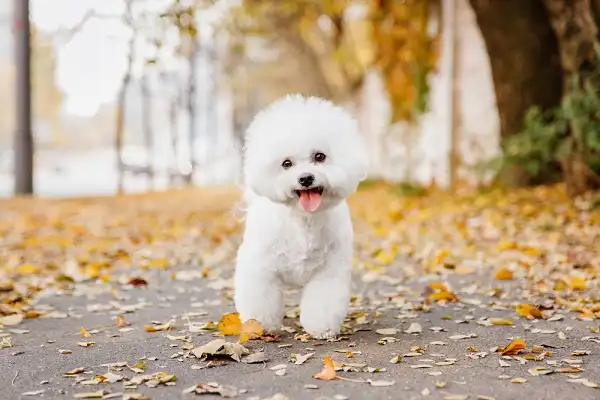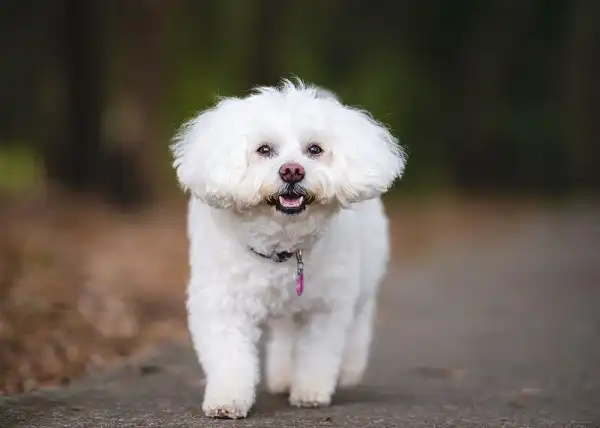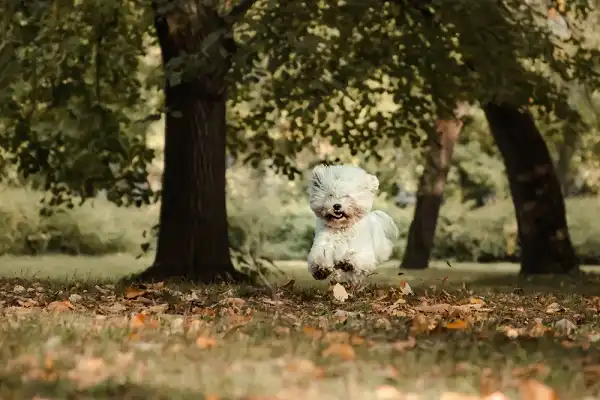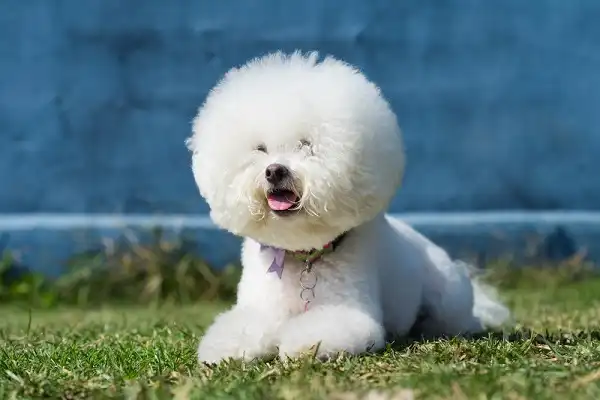The Bichon Frise is a small, white dog breed that originates from the Mediterranean region. The breed is known for its cheerful disposition and hypoallergenic coat. Bichon Frises are low-shedding dogs that require regular grooming to maintain their cute appearance. If you’re looking for a loving and companionable pet, the Bichon Frise might be the perfect fit for you!

Bichon Frise Description
The Bichon Frise is a small, white, and fluffy breed that originated in the Mediterranean region. This lively, intelligent breed is known for its cheerful disposition and hypoallergenic coat. The Bichon Frise has long been a favorite of dog owners who appreciate their intelligence and adaptability to their lifestyle. These low-shedding dogs require regular grooming in order to maintain their neat appearance. With regular brushing and combing, they can stay clean, soft, and tangle-free. They are also quite tolerant of being cut or clipped if desired by the owner. The Bichon Frise is an ideal companion pet as they thrive on human interaction. They are loyal, loving, and affectionate with their owners, as well as other family members and visitors alike.
Bichon Frise Habitat
The Bichon Frise is a breed that is happiest when living in an environment with plenty of familiar people, activity, and stimulation. They thrive on companionship, so they do best when they are part of a family and have access to both indoor and outdoor activities. These dogs require regular exercise and playtime, especially if they live in an apartment or small home. Taking them for daily walks can provide mental stimulation as well as physical activity. A good rule of thumb is to take your Bichon Frise for at least 20 minutes of exercise twice a day. Bichon Frises can do well with other dogs if raised with them from puppyhood, although it’s important to keep their interactions supervised and controlled. They generally get along well with children but may not be the best fit for a household with young children due to their small size.
Bichon Frise Diet
The Bichon Frise should have a diet that is tailored to their individual needs, such as age and activity level. Generally, these small pups require a high-quality diet of nutrient-packed foods with plenty of lean proteins, healthy fats, and complex carbohydrates. They need the ideal balance of vitamins, minerals, and antioxidants to support an active lifestyle and maintain optimal health. A typical Bichon Frise diet should include lean proteins such as chicken, beef, or fish, as well as complex carbs like sweet potatoes, brown rice, and oatmeal. Fruits and vegetables are also important for providing essential vitamins and minerals. Adding in some omega-3 fatty acids from sources like flaxseed oils can help keep your pup’s coat glossy and skin healthy. When it comes to treats for your Bichon Frise, look for natural options like freeze-dried liver or low-fat jerky treats made from wholesome ingredients like salmon or turkey. Avoid giving them too many human food scraps which can cause digestive issues in dogs due to their different nutritional requirements.

Bichon Frise Size
The Bichon Frise is a small breed of dog that typically weighs anywhere between 5 to 14 pounds and stands about 11-12 inches tall when fully grown. The breed is characterized by its distinctively fluffy white fur, which makes them look like little white cotton balls! They have large, dark eyes and rounded black noses that give them an adorable puppy-like appearance. Their coat is made up of two layers; the top layer is long and silky while the bottom layer is dense and fluffy. This combination gives the Bichon Frise it’s signature poofy look. The breed also has a wide variety of colors including apricot, cream, gray, silver, gold, and black. Despite their small size, Bichon Frises are surprisingly strong dogs with an athletic build. They were originally bred as companion dogs so they don’t require a lot of space to live or exercise in. A typical adult Bichon Frise should be able to comfortably run around a small yard or even just inside an apartment without any difficulty.
Bichon Frise Lifespan
The Bichon Frise is a breed that can have a relatively long lifespan of up to 12 to 15 years with good care. With proper nutrition, regular vet checkups, and exercise, these lively dogs can bring lots of joy to their owners for many years! However, the breed does have some genetic health concerns that owners should be aware of such as patellar luxation, hypothyroidism, and hip dysplasia which can shorten their lifespans if left untreated. In order to maximize your pet’s lifespan it is important to give them a diet rich in lean proteins like chicken or fish paired with complex carbs such as sweet potatoes and rice. Incorporating adequate amounts of omega-3 fatty acids from sources like flaxseed oil can help keep your pup’s coat shiny and skin healthy while providing essential vitamins and minerals from fruits and vegetables.

Bichon Frise Behavior
The Bichon Frise is an affectionate and friendly breed with a big personality in a small package. These pups are always up for a good time, whether that be playing fetch, taking long walks, or just snuggling up on the couch with their owners. They have an even temperament and are usually eager to please, making them great choices for families with children. Bichons tend to bond closely with their owners and they can become very attached; this trait is why they are often referred to as ‘velcro dogs’.
As such, they require lots of love and attention from their owners in order to stay healthy both mentally and physically. Leaving them at home alone for too long can cause them to become anxious or depressed so it’s important that you spend plenty of quality time together. Bichons are also very social creatures by nature and they do well in environments where there is plenty of human interaction such as daycare centers or doggy parks. As long as they get regular exercise and plenty of positive experiences around other people and animals, this breed should make an excellent companion pet that you can take anywhere!
Bichon Frise Speed
The Bichon Frise is an athletic dog breed, full of energy and enthusiasm. Despite their small size, they are capable of reaching impressive speeds due to their lightweight build and powerful legs. On average, these pups can move at a maximum speed of up to 20 miles per hour, making them one of the fastest small-breed dogs around. In terms of agility and maneuverability, Bichons can also excel – this breed is quick on its feet and surprisingly agile which allows it to quickly change direction while running or playing. This makes them excellent candidates for activities such as running, sprinting, or even playing sports like flyball or disc dog.

Bichon Frise Hunting
Bichon Frise dogs are not typically known for their hunting abilities, as they tend to prefer interacting with humans and playing games more than chasing after prey. Nonetheless, these agile little pups can still make quite capable hunting companions if properly trained for the task. When it comes time for the hunt, these small yet nimble dogs can be great assets when flushing out rabbits and other small game animals from thick vegetation. Their short legs may limit how fast they can chase after prey but their agility allows them to quickly change direction and navigate through tight spaces – perfect for tracking down fast-moving critters! Overall, Bichon Frises may not be traditional hunting companions but with proper training and socialization, they can still make excellent outdoor partners who will enjoy tagging along on adventures! With lots of patience, consistency, and positive reinforcement these lively little pups make wonderful additions to any family looking for an active companion pet who loves spending time outdoors!
Conclusion
The Bichon Frise is a lively and energetic breed of a small dog that loves to play, run, and explore. Despite their diminutive size they can reach impressive speeds and are surprisingly agile when it comes to changing direction or navigating tight spaces. While not traditionally used as hunting dogs, with the proper training and socialization these pups can make excellent companion animals for those who like spending time outdoors. Whether you’re looking for a running partner or an outdoor buddy, the Bichon Frise makes an ideal choice!
Frequently Asked Question


